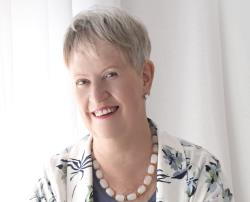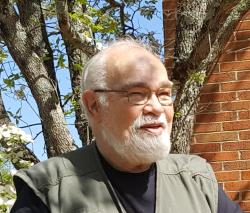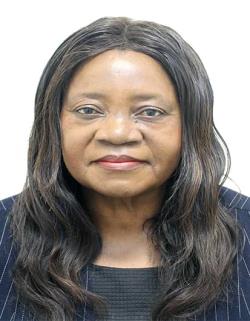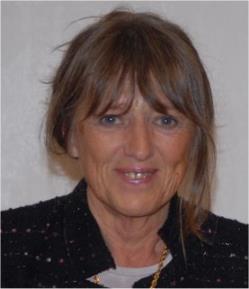"Re" Generative AI: Using Artificial and Human Intelligence in tandem for innovation
International Federation for Information Processing - IP3
Session 140
How humans can use their intelligence and creativity to get the most out of Gen-AI.
In this session, we will explore AI, especially Generative AI, and how it should be used in tandem with Human Intelligence. There will be demonstrations rather than presentations. An AI agent has been created, and the audience can interrogate the agent asking questions about a range of topics. Another interaction will show how AI can be used with HI (Human Intelligence) for innovation. As we explore the different Gen AI tools, we will ask the audience to try them out real time. The panel will address questions from the audience. We want the session to be as interactive as possible, which is why the agenda is flexible.

Moira is a Professional Member and Fellow of IITPSA (Institute of IT Professionals South Africa), She received the IITPSA Distinguished Service in ICT Award in 2009. She is a Vice President of IFIP (International Federation of Information Processing), and Chair of IFIP IP3.
She is an accomplished speaker and has presented at conferences around the world. Notably, she has attended and presented at the WSIS Forum since 2012.
Moira works as an independent consultant, who provides learning design, development, and quality assurance services. Since the advent of Generative AI, she has taken a keen interest in how this technology can transform the way we work. Her commitment to governance and ethics ensures that considers emerging technology through this lens.

Don Gotterbarn has extensive experience both in academia and as a software systems developer working on projects that include: avionics, decision support systems, vote-counting machines, and missile defense systems.
He was a visiting scientist at Carnegie Mellon University, a research fellow at Australian National University, taught at schools like the University of Southern California, and did training for the National Security Agency- USA and TATA Consultancy Services- in India. He is a professor emeritus at East Tennessee State University.
As chair of the ACM's Committee on Professional Ethics, he led the development of the 2018 ACM Code of Ethics which was later adopted by the International Federation for Information Processing. He also led the development of the ACM/IEEE Computer Society Software Engineering Code of Ethics and Professional Practice
He has received various awards for his three decades promoting professionalism in the teaching and practice of computing: including The Joseph Weizenbaum Award, the ACM Presidential Award, and the IFIP David O’Leary Award.
He continues this work by chairing IFIP’s Ethical Frameworks group, as a member of IFIP’s IP3 and the BCS ICT Ethics Specialist Group, and the ACM’s Professional Development Committee.

Stephen Ibaraki, a serial entrepreneur and futurist, has shaped the future of technology with leadership roles in over 100 organizations worldwide. Founder of the UN ITU AI FOR GOOD initiative, his efforts reach over 3 billion globally, fostering AI innovations across the United Nations Sustainable Development Goals. Stephen's extensive network includes engagements with over a million CEOs and investors, contributing significantly to transformative innovations and investments. His accolades include 21 Microsoft Global Awards and founding roles in several influential tech initiatives. Stephen’s visionary approach and dedication position him as a pivotal leader in global technology and entrepreneurship.

Joyce is the President of the Computer Society of Zimbabwe, and the founder, Managing Consultant and CEO of X-Pert Solutions, which focuses on delivery of Business Strategies, Information and Communications Technology (ICT) Solutions, and Project Management. She is a Non-Executive Director who sits on Boards where she advises on ICT Strategic matters which include application of Artificial Intelligence (AI) and its relevance to specific Businesses. She is a current Board Member of IFIP, IP3.
Joyce is a renowned ICT Strategic Leader with focus on Digital Transformation incorporating Big Data Analytics in the AI context, ICT Governance encompassing ISO Standards, Business Continuity Planning, Disaster Recovery, ICT Audit and Cybersecurity.
She is a Professional Member of the Computer Society of Zimbabwe (PMCSZ). She holds an MBA degree from Nottingham Trent University (UK), a Diploma in Management Studies from Nottingham Trent University (DMS, UK), Financial Management Diploma (ACCA, UK) and a Certificate in E-Management from Wits University (SA). She also holds a Certificate in Business Project Management (Wits University, SA), and EDP (UZ) from the University of Zimbabwe.

Eliezer Manor is today a businessman engaged in hi-tech entrepreneurship, venture capital, corporate venture capital and venture philanthropy. His activities are carried out through his wholly owned company – Shirat Enterprises Ltd www.shirat-enterprises.com . Shirat is holding a portfolio of private investments and in parallel acts as a Management Company.
He is a physicist, graduate of the Weizmann Institute of Science in Israel, who spent many years with the Israeli Defense Forces and the R&D Department of the Ministry of Defense in the field of Electro-Optics.
His past and present activities cover all the “spectrum” and sequence of hi-tech and venture capital related activities:
· Hi-tech entrepreneurship in Israel and in the US
· Founder of start-up hi-tech companies
· Angel investments
· Technological incubation in Israel,
· Venture Capital in Israel, in the US and in China,
· Corporate Venture Capital and Open Innovation
· Intrapreneurship and Internal Corporate Innovation programs
· Joint programs with Multi-National Companies in the fields of technology and hi-tech investments,
· Joint programs with Israeli and foreign governments, in the fields of hi-tech, venture capital, technology transfer from academia to industry, education for innovation & entrepreneurship
· Investment Banking and Stock Markets of hi-tech/hi-growth companies.
· Bi-national force multiplying programs in the fields of entrepreneurship, hi-tech, open-innovation and incubation, between Israel and other countries,
· Board Membership of private and public companies traded on NASDAQ and on TASE
· Author of 2 books related to education of children and adults to hi-tech entrepreneurship.
· Founder and first Executive Director of IVA – the Israeli Venture Capital Association.
· Lecturer in MBA programs for innovation and entrepreneurship (including workshops)
· Venture philanthropy – a family fund to support studies and encourage creative thinking of youngsters coming from disadvantaged families.
Recently he was engaged in a broad program with Israeli companies which establish operations in China for business development, industrialization, and commercialization of their products in the Chinese and worldwide markets. The program was carried out by Shirat together with local governments and with large companies from China, within the framework of Open Innovation and Business Oriented Incubators.
Eliezer is also partner in REDDS Open Innovation VC Fund, as a GP member

Eunika Mercier-Laurent is electronic engineer, PhD in computer science, expert in artificial intelligence, associate researcher with University of Reims Champagne Ardennes https://crestic.univ-reims.fr/fr/mercier-laurent and Professor at EPITA International Programs https://www.epita.fr/en/.
She has over 15 years of involvement with IFIP including the Chair position of Technical Committee 12 on Artificial Intelligence since 2019 and Chair of WG 12.6 (AI for Knowledge Management). She is French representative of TC12 since 2018.
Her teaching and MOOC includes Knowledge Management & Innovation powered by AI, Neuro-symbolic AI, Ethical Development of AI Systems, Innovation Ecosystems and Innovation Week Challenges.
After working as researcher in INRIA, computers designer and manager of innovative AI applications worldwide with Groupe Bull, she founded Global Innovation Strategies devoted to all aspects of Knowledge Innovation powered by AI.
Among her research topics are: Knowledge and Eco-innovation Management Systems, AI methods and techniques for innovation, knowledge modelling and processing, complex problem solving, AI for sustainability, eco-design and impacts of artificial intelligence.
She is President of Innovation3D, International Association for Global Innovation, expert for EU and national programs, member of Managing Body of the EU K4I (https://www.knowledge4innovation.eu) and author of over hundred scientific publications and books. Among the last “The Innovation Biosphere, Planet and Brains in Digital Era”, “Intelligence in Energy” with G. Kayakutlu and “World Class Cooking for Solving Global Challenges” with L. Edvinsson.
She runs the annual workshop AI for Sustainability, the last https://sites.google.com/view/ai4s/home, the selected, extended papers are published in Springer AICT serie.

Margaret Havey is a Technical Advisor at Shared Services Canada, the Department responsible for the Government of Canada’s ICT infrastructures. She is a Professional Member and Fellow of CIPS and the Canada Country Member Representative to IFIP. Margaret is a member of the IFIP International Professional Practice Partnership (IP3) and was on the IFIP Task and Finish Group responsible for the IFIP ICT Code of Ethics.
-
 C3. Access to information and knowledge
C3. Access to information and knowledge
-
 C4. Capacity building
C4. Capacity building
-
 C6. Enabling environment
C6. Enabling environment
-
 C7. ICT applications: benefits in all aspects of life — E-learning
C7. ICT applications: benefits in all aspects of life — E-learning
-
 C10. Ethical dimensions of the Information Society
C10. Ethical dimensions of the Information Society
C3 - Generative AI (Gen-AI) provides powerful access to knowledge and information
C4 - Gen-AI has the potential to build capacity because it significantly extends the reach and access to information and ideas
C6 - Gen-AI democratizes access to quality information and insights
C7 Elearning - Gen AI can accelerate the development of quality e-learning
C10 - Ethical considerations will be explored and emphasized
-
 Goal 4: Ensure inclusive and equitable quality education and promote lifelong learning opportunities for all
Goal 4: Ensure inclusive and equitable quality education and promote lifelong learning opportunities for all
-
 Goal 5: Achieve gender equality and empower all women and girls
Goal 5: Achieve gender equality and empower all women and girls
-
 Goal 8: Promote inclusive and sustainable economic growth, employment and decent work for all
Goal 8: Promote inclusive and sustainable economic growth, employment and decent work for all
-
 Goal 16: Promote just, peaceful and inclusive societies
Goal 16: Promote just, peaceful and inclusive societies
-
 Goal 17: Revitalize the global partnership for sustainable development
Goal 17: Revitalize the global partnership for sustainable development
Goal 4 & 5- Gen-AI democratizes access to information and knowledge and enables lifelong learning
Goals 8 - Artificial intelligence along with other emerging technologies will create employment opportunities for decent work. Safe use of this technology can accelerate economic growth
Goal 16 - Reasons are as above
Goal 17 - participating in the WSIS Forum contributes to this goal
https://www.linkedin.com/company/ifip--international-federation-for-information-processing/
www.ifip.org
www.ipthree.org